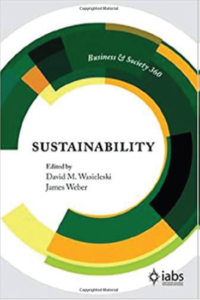The paper “Business and Society in the Anthropocene” by Paul Shrivastava and Laszlo Zsolnai was published in the book Sustainability – Business and Society 360, (edited by David M. Wasieleski and James Weber, 2020, Emerald Publishing, pp. 3–15).

The paper aims to redirect Business and Society scholarship to embrace the unprecedented challenges of the Anthropocene era including climate collapse and ecological breakdown. The existential risk presented by the new reality of the Anthropocene requires a radical rethinking of the purpose of business and its dominating working models. The paper discusses the problems of efficiency and growth and shows that business efficiency and growth often result in aggregate ecological overshot. It is argued with Herman Daly that frugality, i.e. substantial reduction of the material throughput should precede business efficiency for achieving ecological sustainability.
The paper suggests new directions for Business and Society scholarship by highlighting three major issues, namely the scale of business activities relative to the ecosystem of the planet, short termism that is the discrepancy between the time horizon of business decisions and that of ecological processes, and inequality which is the result of current business models that are all about accumulation of wealth and not paying enough attention to distribution of wealth.
The paper concludes that the Anthropocene era represents a clear disjuncture and discontinuity from the past and business needs to find a new realignment to achieve a sustainable world. That realignment requires a drastic modification of business-nature relations. The authors think that a vital mission of Business and Society scholarship is to study the possibility of changes at different levels in the business – nature nexus for achieving sustainability. Without making a sustainability case for business there is little hope for survival on our rapidly deteriorating Earth.